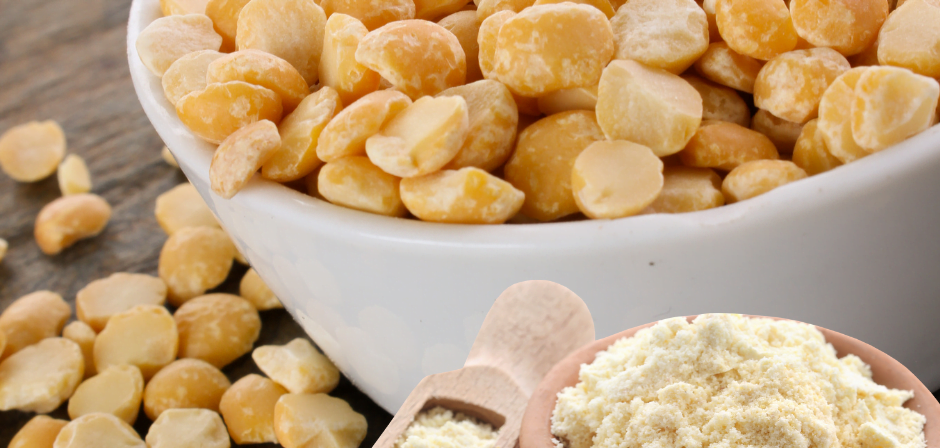Why Healthyroo Golden Pea Protein Isolates are Superior
Healthyroo Pea Protein Isolate is derived from yellow peas, often called “split peas” or “golden peas.” The term “isolate” indicates that the protein has been isolated from the whole pea to achieve a higher protein content, typically around 85-90% protein by weight. This is one of the primary reasons why Healthyroo protein powders are much better than the ones you find in the market.

What Makes Healthyroo Golden Pea Protein Isolates Superior?
Golden pea protein stands out distinctly from the traditional green pea protein. This distinction contributes to the superiority of Healthyroo protein powders over other products available in the market.
- Colour: It has a golden hue, while regular pea protein is greenish.
- Taste: Golden pea protein has a more neutral flavour than regular pea, which can taste slightly bitter.
- Protein content: Golden pea protein contains about 85-90% protein, whereas regular pea protein contains around 75% protein.
- Solubility: Golden pea protein is more water-soluble than regular pea protein. This makes it easier to mix into liquids without clumping.
- Digestibility: Some research suggests golden pea protein may be more digestible than regular pea protein.
But there are also more outstanding reasons why Healthyroo proteins outperform the competition. Let’s look at their nutritional profile and the benefits they provide.
Table of Contents
Nutritional Profile
Essential Nutrients in Abundance
Healthyroo’s Golden Pea Protein Isolates stand out for its rich nutritional content. They have all nine essential amino acids vital for muscle repair and growth, making the product a favourite among fitness enthusiasts.
While Pea Protein isolate is a powerhouse, it falls slightly short in methionine content. However, Healthyroo addresses it by simply incorporating Brown Rice Isolates into its protein powders, ensuring balanced amino acid profiles.

Benefits of Healthyroo Golden Pea Protein Isolates
Healthyroo Pea Proteins are a 1000 Mesh Protein
Our 1000 mesh pea protein powder is unmatched in Australia, offering an unparalleled fineness for smoother shakes without the gritty texture of other brands.
A Robust Alternative to Traditional Proteins
You can now bid goodbye to the potential negatives of meat, eggs, and whey protein. Healthyroo’s Pea Protein Isolates are a superior choice, devoid of saturated fats, excessive calories, cholesterol, or digestive discomfort.
Neutral Taste
Golden pea protein has a more neutral flavour than regular pea protein. It lacks the slightly bitter taste associated with regular pea protein made from green peas.
Its milder taste makes golden pea protein versatile to add to foods, shakes and recipes without negatively affecting the flavour. It can more easily be used to boost the protein content of foods.
High Solubility
Golden pea protein powder has excellent solubility in water. This means it can dissolve fully when mixed in liquids for smooth texture and consistency.
Regular pea protein tends to clump more. The high solubility makes golden pea protein a good choice as a supplement to mix into shakes, smoothies or soups.
Digestion Made Easy
One of the standout features of our pea protein is its digestibility. The body can easily break it down, ensuring the essential amino acids are quickly available where they’re most needed.
Allergies? Not a Concern Here!
With the increasing number of individuals suffering from allergies or dietary restrictions, finding a suitable protein source can be challenging. But worry not! This pea protein isolate is free from common allergens, making it gluten-free and lactose-free. It’s the perfect pick for those who usually have to tread carefully with their food choices.
A Steady Protein Supply for Your Body
Whether it’s energy production or facilitating various bodily functions, proteins play a pivotal role. And with Healthyroo’s proteins, you get a steady, uninterrupted supply to keep your body functioning optimally.
Muscle Maintenance and Growth
For those invested in fitness, muscle repair and growth are paramount. Our pea protein isolates can greatly benefit muscle synthesis. It’s the ideal companion for your fitness journey.
Keeping Hunger at Bay
The protein’s ability to regulate appetite is noteworthy. Promoting a feeling of fullness aids in weight management, ensuring you’re not reaching out for unhealthy snacks between meals.
Consumption and Uses
The versatility of Healthyroo pea protein is evident in the ways you can incorporate it into your diet:
Forms of Consumption
- Drinks: Easily mixable in water or juices, it’s perfect for a quick protein boost.
- Meals: Sprinkle it over salads or stir it into soups for an added protein punch.
Recipe Ideas Using Healthyroo Protein Powders
- Smoothies: Blend pea protein with fruits, veggies, and nuts for a wholesome smoothie.
- Oatmeal: A scoop of pea protein in your morning oatmeal can kickstart your day with energy.
- Baked Goods: Add pea protein to enhance the nutritional profile of muffins, bread, or cookies.
- Plant-Based Milk: Stir it into almond, soy, or oat milk for a richer, protein-packed drink.
FAQs about Pea Protein Isolates
Is pea protein isolate good or bad for you?
Pea protein isolate is generally good for you, offering a rich source of vegan protein without common allergens. However, individual reactions may vary, and one must consider one’s dietary needs and restrictions.
What is pea protein isolate used for?
Pea protein isolate is primarily used as a protein supplement to support muscle growth, repair, and overall health. It’s also popular in vegan and vegetarian foods to boost protein content.
Is pea protein isolate better than soy protein isolate?
Both pea and soy protein isolates have their merits. While pea protein is hypoallergenic and suitable for those with soy allergies, soy protein has a slightly more comprehensive amino acid profile. The choice often comes down to personal preference and dietary needs.
Is pea protein isolate complete?
Pea protein isolate contains all nine essential amino acids, making it a complete protein. However, it is relatively lower in methionine than other protein sources.

